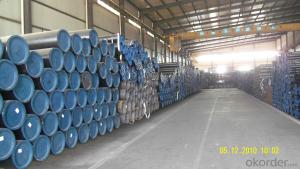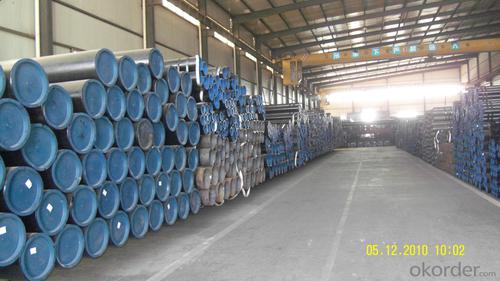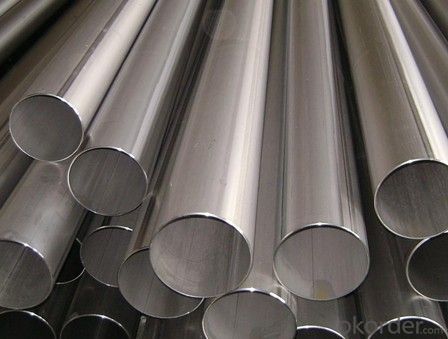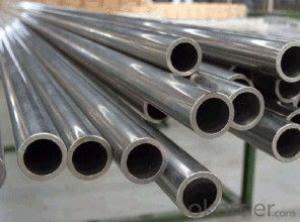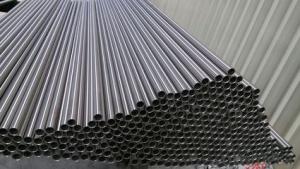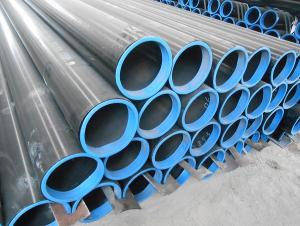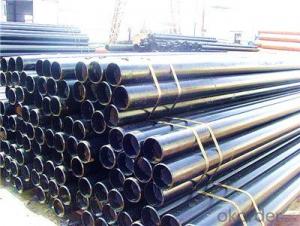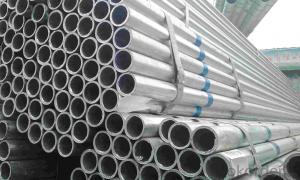Seamless Pipe with High Quality
- Loading Port:
- China Main Port
- Payment Terms:
- TT or LC
- Min Order Qty:
- -
- Supply Capability:
- -
OKorder Service Pledge
OKorder Financial Service
You Might Also Like
Specifications
1. OD 21MM-1066MM, WT 2MM-60MM
2. certificate: ISO, API
3. Strength: large diameter thick wall seamless pipe
4. BE, PE.
Carbon Steel Seamless Pipes | |
OD | 21.3mm-1066.8mm(1/2”-42”) |
WT | 2mm-60mm |
Length | Random Length: 3.5m-12m, or fixed length 5.8m or as the customer’s requirement. |
Standard | ASTM A53, ASTM A106, API 5L, DIN 17175, GOST8731/8732, G3457/G3452 etc. |
Material | Q235B, 10#,20#,45#, 16Mn, 15MnV. A53B, A106B, API5L B, A192, A179C, A213-T12, A213-T22, A335-P1, A335-P2, A333 ST37, ST33, ST37-2, ST35.8 ST42 etc. |
Certificate | API certificate and ISO certificate. |
Surface | Rust remove, black painting, antirust oil, varnish, 3PE, hot-dip galvanized etc. |
Package | By bundles, plastic caps or steel caps, woven, wooden cases or as requirement. |
Capability | 6000tons/month. |
End | BE/PE. |
Advantage | Big diameter and thick wall pipes. Best price with good quality. The partner you can trust. Good service and very patient. |
Seamless steel pipe | ||||
Alloy pipe | Cr5Mo(P5, STFA25, T5) 15CrMo(P11, P12, STFA22) 13CrMo44 12Cr1MoV P22 (10CrMo 910) T91, P91, P9, T9 Wb36 | GB5310-95 GB9948-88 ASTM335/A335M ASTM213/213M DIN17175-79 JISG3467-88 JISG3458-88 | 16-824*2-100 | The seamless steel pipe features resistance to high pressure, high/low temperature and corrosion and is used in the industries of petroleum, chemical engineering and electric power as well as boiler |
High-pressure boiler pipe | 20G, A106, ST45.8/ | GB5310-95 ASTMA106-99 DIN17175-79 | 14-630*2-80 | Temperature-resistant seamless steel pipe for high-pressure boiler |
High-pressure seamless pipe for petroleum cracking and fertilizer making equipments | 20, 12CrMo, 15CrMo | GB9948-88 | 10-530*1.5-36 | Boiler price for refinery, heat-exchanging pipe, seamless steel pipe for pipeline |
20, 16Mn, Q345 | GB6479-2000 | 18-530*3-40 | Fertilizer making equipment and pipe line | |
Low and medium pressure boiler pipes | 10, 20 | GB3087-1999 | 10-530*2-40 | Over-heat pipe for low and medium-pressure boiler, boiling water pipe, locomotive smoke pipe(big and small) |
Fluid pipe | 20, Q345 | GB/T8163-1999 | 8-630*1.0-40 | |
Structural pipe | 10,20,35,45, 16Mn, Q345B | GB/T8162-1999 | 6-1020*1.5-100 | |
Line pipe | Grade B | API | 60-630*1.5-40 | Carrying gas, water or oil in the industries of petroleum and natural gas |
Hydraulic prop pipe | 27SiMn | GB/T17396-1998 | 70-377*9-40 | |
Ship pipe | 410 | GB/T5312-1999 | 14-426*1.5-45 | Pipes for ship, boiler and over-heater |
FAQ of Seamless Pipe:
①How is the quality of your products?
Our products are manufactured strictly according to national and internaional standard, and we take a test on every pipe before delivered out. If you want see our quality certifications and all kinds of testing report, please just ask us for it.
Guaranteed: If products’ quality don’t accord to discription as we give or the promise before you place order, we promise 100% refund.
②How about price?
Yes, we are factory and be able to give you lowest price below market one, and we have a policy that “ for saving time and absolutely honest business attitude, we quote as lowest as possible for any customer, and discount can be given according to quantity”,if you like bargain and factory price is not low enough as you think, just don’t waste your time.Please trust the quotation we would give you, it is professional one.
③Why should you chose us?
Chose happens because of quality, then price, We can give you both.Additionally, we can also offer professional products inquiry, products knowledge train(for agents), smooth goods delivery, exellent customer solution proposals.Our service formula: good quality+good price+good service=customer’s trust
SGS test is available, customer inspection before shipping is welcome, third party inspection is no problem.
Seamless Pipe Images:
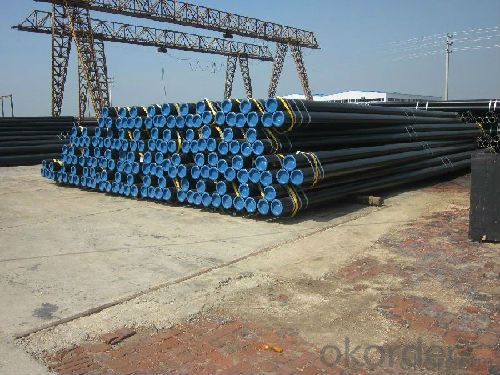
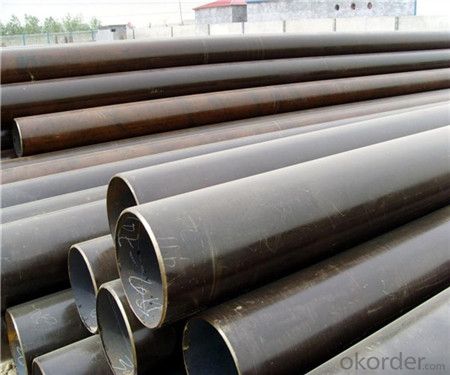
- Q: How do you prevent steel pipes from rusting?
- To prevent steel pipes from rusting, a common method is to apply a protective coating such as paint or epoxy. Additionally, regularly inspecting and maintaining the pipes, promptly repairing any damage or corrosion, and ensuring proper drainage to prevent moisture buildup are essential preventive measures.
- Q: What's the material of Q325 steel pipe?
- In terms of deoxidation methods, F, B, Z can be expressed as boiling steel, flat killed steel, killed steel and boiling steel. They are deoxidized steel, which is of poor plasticity and toughness. Welded joints made of this material are susceptible to cracks when subjected to dynamic loads. Should not work at low temperatures, sometimes hardening. In contrast, calming steel is excellent and uniform, with good plasticity and toughness.
- Q: What are the different types of steel pipes available?
- There are various types of steel pipes available in the market, each designed to meet specific requirements in different applications. Some of the commonly used types of steel pipes include: 1. Carbon Steel Pipes: These are the most common type of steel pipes and are primarily made of carbon. They are used in a wide range of applications, including transportation of fluids and gases, structural applications, and plumbing. 2. Stainless Steel Pipes: These pipes are made of an alloy that contains a high percentage of chromium, which provides excellent corrosion resistance. Stainless steel pipes are widely used in industries such as oil and gas, chemical processing, and food processing. 3. Alloy Steel Pipes: As the name suggests, these pipes are made of an alloy that contains a combination of different elements, such as chromium, molybdenum, and nickel. Alloy steel pipes offer enhanced strength, durability, and resistance to high temperatures, making them suitable for applications in power plants, refineries, and petrochemical industries. 4. Galvanized Steel Pipes: These pipes are coated with a layer of zinc to protect them from corrosion. Galvanized steel pipes are commonly used in plumbing systems, water supply lines, and outdoor structures due to their excellent resistance to rust and long-lasting durability. 5. Seamless Steel Pipes: These pipes are manufactured without any welding seam and are often preferred for applications that require high pressure, high temperature, or a smooth inner surface. Seamless steel pipes are commonly used in industries such as oil and gas, automotive, and aerospace. 6. Welded Steel Pipes: These pipes are manufactured by welding two pieces of steel together. They are available in various shapes and sizes and are commonly used in construction, water supply systems, and general engineering applications. 7. ERW (Electric Resistance Welded) Steel Pipes: These pipes are manufactured by passing a high-frequency electric current through the steel strip and then welding the edges together. ERW steel pipes are widely used in oil and gas transportation, structural applications, and fencing. 8. LSAW (Longitudinal Submerged Arc Welded) Steel Pipes: These pipes are made by bending and welding a steel plate into a cylindrical shape. LSAW steel pipes are commonly used in large-scale infrastructure projects, such as oil and gas pipelines and bridge construction. In summary, the different types of steel pipes available include carbon steel pipes, stainless steel pipes, alloy steel pipes, galvanized steel pipes, seamless steel pipes, welded steel pipes, ERW steel pipes, and LSAW steel pipes. The choice of steel pipe type depends on the specific requirements of the application, including factors such as corrosion resistance, strength, temperature, and pressure resistance.
- Q: What are the different methods of measuring the thickness of steel pipes?
- There are several methods that can be used to measure the thickness of steel pipes, including ultrasonic testing, magnetic particle inspection, eddy current testing, and laser scanning.
- Q: How do steel pipes handle seismic expansion joints?
- Steel pipes handle seismic expansion joints by allowing for movement and flexibility. These pipes are designed to withstand the forces caused by seismic activity, such as earthquakes, by accommodating expansion and contraction without causing damage to the overall structure. The joints in steel pipes are often equipped with specialized components, such as bellows or flexible couplings, that can absorb the movement and prevent excessive stress on the pipeline. This ensures the integrity and safety of the pipeline system during seismic events.
- Q: Can steel pipes be used for fencing or railing?
- Yes, steel pipes can definitely be used for fencing or railing purposes. Steel pipes are known for their durability, strength, and resistance to corrosion, making them a popular choice for construction projects like fencing and railings. They provide a sturdy and long-lasting solution for securing properties or creating barriers, while also offering an aesthetically pleasing and modern look.
- Q: What are the different types of valves used with steel pipes?
- There are several types of valves commonly used with steel pipes, including ball valves, gate valves, globe valves, check valves, and butterfly valves.
- Q: How are steel pipes used in oil refineries?
- Steel pipes are used extensively in oil refineries for various purposes, such as transporting crude oil, petroleum products, and chemicals throughout the facility. They are also used in the construction of equipment, such as distillation columns and heat exchangers, where they provide a reliable and durable means of transferring fluids and withstanding high temperatures and pressures.
- Q: Can steel pipes be used for chemical storage tanks?
- The utilization of steel pipes for chemical storage tanks is contingent upon the specific application and the composition of the chemicals in question. Steel, being a robust and enduring material, is generally well-suited for a multitude of industrial purposes. Nevertheless, certain chemicals have the potential to corrode steel, thereby compromising the tank's integrity. In such instances, it is imperative to employ corrosion-resistant coatings or linings on the steel pipes to safeguard against chemical reactions. Furthermore, adherence to industry standards and regulations during the tank's design and construction is crucial to guarantee the safe storage of chemicals. Consequently, while steel pipes can indeed be deployed for chemical storage tanks, meticulous consideration must be given to the nature of the chemicals being stored, and appropriate measures must be taken to prevent corrosion and ensure safety.
- Q: What is the difference between steel pipes and fiberglass-reinforced pipes?
- The main difference between steel pipes and fiberglass-reinforced pipes lies in their composition and structural properties. Steel pipes are made primarily of iron and carbon, which provide high strength and durability. On the other hand, fiberglass-reinforced pipes consist of a composite material that combines a resin matrix with glass fibers, offering excellent corrosion resistance and high tensile strength. Additionally, steel pipes are heavier and require more maintenance, while fiberglass-reinforced pipes are lighter, easier to install, and have a longer lifespan.
Send your message to us
Seamless Pipe with High Quality
- Loading Port:
- China Main Port
- Payment Terms:
- TT or LC
- Min Order Qty:
- -
- Supply Capability:
- -
OKorder Service Pledge
OKorder Financial Service
Similar products
Hot products
Hot Searches
Related keywords
